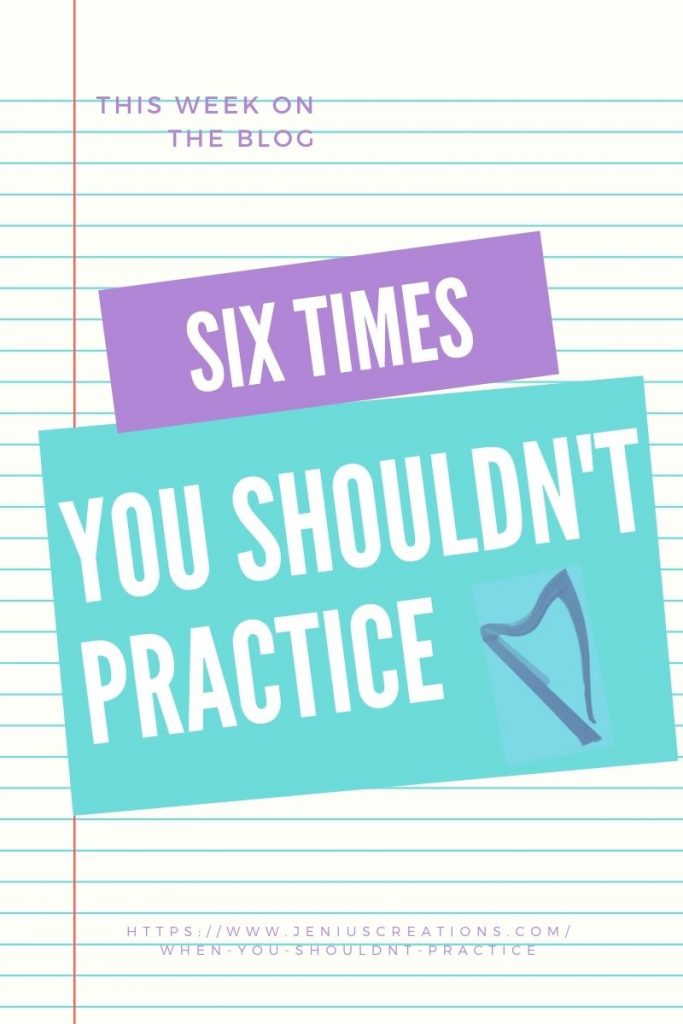You’re not going to believe that I’m about to tell you this! You might want to be sitting before you read on.
There are times when you SHOULDN’T practice!
I did say that you that you wouldn’t believe I was going to say that. But it is true.
 Of course, you know that you need to practice. You know that if you want to move yourself toward playing more, better, faster, stronger – you need to practice. The quality time you spend on the bench is directly related to your progress and development. And even in those times when you not “feeling” it, you still know you need to do it.
Of course, you know that you need to practice. You know that if you want to move yourself toward playing more, better, faster, stronger – you need to practice. The quality time you spend on the bench is directly related to your progress and development. And even in those times when you not “feeling” it, you still know you need to do it.
But there are a few very specific times when you should not practice. Times when practicing has the potential to make the situation worse, or to derail all your hard work. What are these very specific reasons to not practice? Here are six:
- You are in pain – this should be a no brainer, and yet, I feel compelled to include it anyway. If you feel pain when you are playing, no matter where you feel it, no matter what type of pain it is, stop. Visit your physician, and have the pain addressed. I know, duh…but it had to be said.
- You are injured – this is like the above, but slightly different. If you are injured, you’ll likely have had pain (ref 1 above). But at some point in your recovery, you might have little to no pain. And because you are beginning to feel better you might try to get back to practicing, even though you know you’re meant to rest a little longer. But failing to give yourself that resting time might result in further injury. Again, duh. Don’t do it!
- You are exhausted – I don’t mean you’re tired, I mean you’re really really really tired. You know the kind. Not the, “oh I wish I had gone to bed a little earlier” kind of tired. More like the “I haven’t slept for days because I’m over-stressed and I’m barely keeping it together” kind of exhausted. You probably already know that being this fatigued will result in reduced cognitive performance. You probably also know that it will be frustrating and annoying. Neither of these emotions will help you deal well with the rigors of practicing. Being so fatigued also means that you probably won’t really learn anything from your practice time. So you’d be better off using the time getting some rest and returning to practicing later.
- You are really busy – here I don’t mean your normal everyday busy, but more like when you’re crushed with way too much to do and no time to do it (and likely not getting enough sleep – ref 3 above). With that kind of mental load, you won’t be able to focus on the work you need to do in your practice. And you might also spend your valuable cognitive practice energy fussing about not doing the things you should be doing rather than thinking about your practice – not very productive. It would be better to forego practicing so you can concentrate on what you are busy doing and come back when you can be deliberate with your playing.
- You are experiencing exceptional stress – again, not everyday stress. By this I mean you’re experiencing significant life changes or events. You might, because you’re diligent, feel that you must, regardless of other things going on in your life, insert a practice. But be open to not practicing, especially at the height of the stress. If I wasn’t writing about when you should consider not practicing, this is where I would also suggest that you could, in this instance, play but not practice. Your harp could provide succor in tough times, but just play, be with your harp and your music, don’t practice.
- You are stuck – we all go through times that we get stuck – when we just aren’t concentrating on the music we want to play. Simply stepping away may give you the clarity to get unstuck. Take a walk, meditate, or do something that you know will help clear your head.
All of us have had experienced these things at some level. And when we do, a bit of a break can help. The real trick is to give ourselves permission to give our practice a miss briefly to gain clarity. The other trick is to ensure that we get back into practice quickly after a tiny break so we avoid drifting into not practicing at all. Use your practice journal to help you get through the break and get back on track with your practicing when you come back.
Have you taken a brief break in your practice for these (or other) reasons? Let me know in the comments!